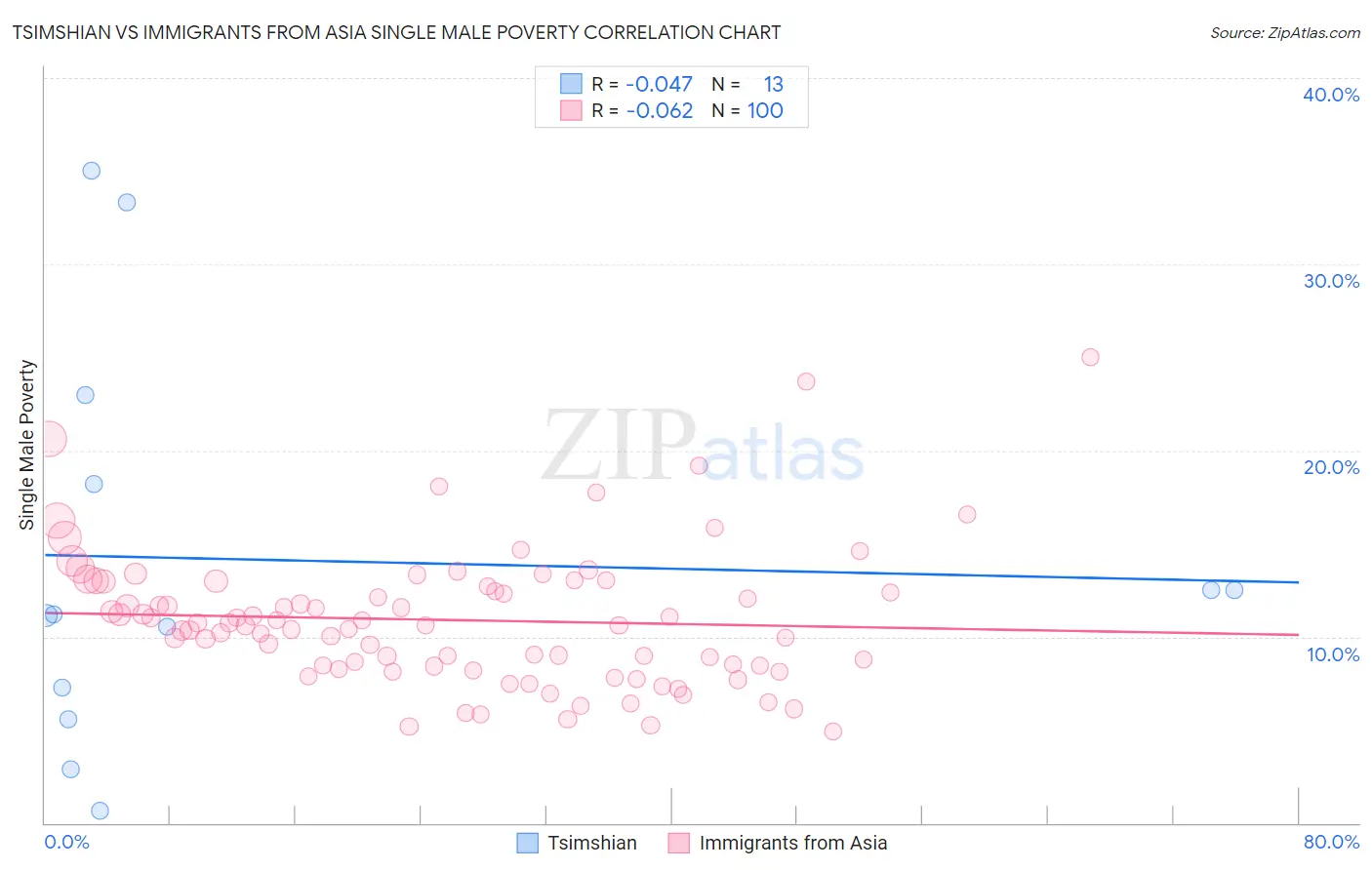Tsimshian vs Immigrants from Asia Single Male Poverty
COMPARE
Tsimshian
Immigrants from Asia
Single Male Poverty
Single Male Poverty Comparison
Tsimshian
Immigrants from Asia
11.1%
SINGLE MALE POVERTY
100.0/ 100
METRIC RATING
17th/ 347
METRIC RANK
11.4%
SINGLE MALE POVERTY
100.0/ 100
METRIC RATING
28th/ 347
METRIC RANK
Tsimshian vs Immigrants from Asia Single Male Poverty Correlation Chart
The statistical analysis conducted on geographies consisting of 15,184,225 people shows no correlation between the proportion of Tsimshian and poverty level among single males in the United States with a correlation coefficient (R) of -0.047 and weighted average of 11.1%. Similarly, the statistical analysis conducted on geographies consisting of 461,688,534 people shows a slight negative correlation between the proportion of Immigrants from Asia and poverty level among single males in the United States with a correlation coefficient (R) of -0.062 and weighted average of 11.4%, a difference of 2.7%.

Single Male Poverty Correlation Summary
| Measurement | Tsimshian | Immigrants from Asia |
| Minimum | 0.66% | 4.9% |
| Maximum | 35.0% | 25.0% |
| Range | 34.3% | 20.1% |
| Mean | 14.1% | 10.9% |
| Median | 11.2% | 10.6% |
| Interquartile 25% (IQ1) | 6.4% | 8.4% |
| Interquartile 75% (IQ3) | 20.6% | 12.8% |
| Interquartile Range (IQR) | 14.2% | 4.4% |
| Standard Deviation (Sample) | 10.7% | 3.7% |
| Standard Deviation (Population) | 10.2% | 3.6% |
Demographics Similar to Tsimshian and Immigrants from Asia by Single Male Poverty
In terms of single male poverty, the demographic groups most similar to Tsimshian are Bhutanese (11.1%, a difference of 0.090%), Immigrants from Bolivia (11.1%, a difference of 0.33%), Immigrants from Moldova (11.2%, a difference of 0.72%), Ethiopian (11.2%, a difference of 0.74%), and Korean (11.0%, a difference of 0.85%). Similarly, the demographic groups most similar to Immigrants from Asia are Immigrants from China (11.4%, a difference of 0.070%), Immigrants from Egypt (11.4%, a difference of 0.10%), Iranian (11.4%, a difference of 0.16%), Immigrants from Iran (11.4%, a difference of 0.25%), and Immigrants from Eastern Asia (11.4%, a difference of 0.34%).
| Demographics | Rating | Rank | Single Male Poverty |
| Immigrants | Afghanistan | 100.0 /100 | #12 | Exceptional 10.9% |
| Immigrants | South Central Asia | 100.0 /100 | #13 | Exceptional 10.9% |
| Chinese | 100.0 /100 | #14 | Exceptional 11.0% |
| Koreans | 100.0 /100 | #15 | Exceptional 11.0% |
| Bhutanese | 100.0 /100 | #16 | Exceptional 11.1% |
| Tsimshian | 100.0 /100 | #17 | Exceptional 11.1% |
| Immigrants | Bolivia | 100.0 /100 | #18 | Exceptional 11.1% |
| Immigrants | Moldova | 100.0 /100 | #19 | Exceptional 11.2% |
| Ethiopians | 100.0 /100 | #20 | Exceptional 11.2% |
| Asians | 100.0 /100 | #21 | Exceptional 11.2% |
| Immigrants | Pakistan | 100.0 /100 | #22 | Exceptional 11.2% |
| Bolivians | 100.0 /100 | #23 | Exceptional 11.2% |
| Indians (Asian) | 100.0 /100 | #24 | Exceptional 11.3% |
| Maltese | 100.0 /100 | #25 | Exceptional 11.3% |
| Immigrants | Japan | 100.0 /100 | #26 | Exceptional 11.3% |
| Immigrants | China | 100.0 /100 | #27 | Exceptional 11.4% |
| Immigrants | Asia | 100.0 /100 | #28 | Exceptional 11.4% |
| Immigrants | Egypt | 100.0 /100 | #29 | Exceptional 11.4% |
| Iranians | 100.0 /100 | #30 | Exceptional 11.4% |
| Immigrants | Iran | 100.0 /100 | #31 | Exceptional 11.4% |
| Immigrants | Eastern Asia | 100.0 /100 | #32 | Exceptional 11.4% |